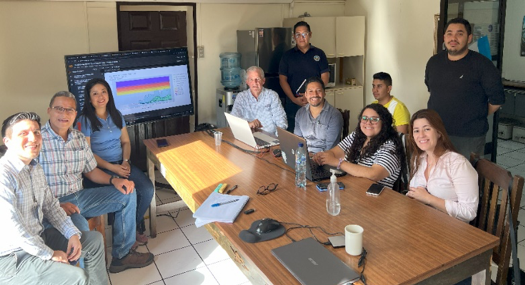WMO, in collaboration with the Central American Regional Committee for Hydraulic Resources (CRRH), has implemented a new approach to capacity development in the area of hydrology in Central America.
The approach leverages the voluntary exchange of knowledge between expert trainers, expert networks and WMO Regions and Regional Training Centres (RTC) to optimize resource investments. According to the WMO, this hydrological capacity development is essential to support Belize, Costa Rica, El Salvador, Guatemala, Honduras, Nicaragua and Panama in preparing to engage in the WMO Global Hydrological Status and Outlook System (HydroSOS).
Over the past two years, WMO and CRRH have completed on-site assessments of the capabilities of the National Hydrological Services (NHSs) of each country, which highlighted their capacity development needs. The assessments were used in the Regional Implementation Plan in consultation with the countries, which was endorsed by the Nineteenth Session of the World Meteorological Congress (Cg-19). Within that framework, a four-course training program was refined to improve hydrological capabilities for HydroSOS. Each course focuses on one of the four elements of the value chain for operational hydrology: observation and instrumentation; data analysis and processing; modelling; and prediction/forecasting.
Six organizations – Facultad de Ingeniería y Ciencias Hídricas (FICH) of the Universidad Nacional del Litoral (a WMO RTC node in Argentina); Instituto de Pesquisas Hidráulicas (IPH) of the Universidade Federal do Rio Grande do Sul (Brazil); Red Iberoamericana para el Monitoreo y Pronóstico de Fenómenos Hidrometeorológicos (PROHIMET); Dirección General del Observatorio de Amenazas (El Salvador); Brigham Young University (USA); and Centro Internacional de Agricultura Tropical (CIAT, Colombia) – contributed 11 expert trainers. Collaboration with FICH allowed the development of a Moodle virtual classroom to support the four training modules.
From September to December 2023, 320 professional and technical staff from NHSs and partner hydrological institutions participated in 22 in-country training sessions. Four regional closing workshops (hybrid sessions) enabled 158 of those participants to share the lessons learned from the courses, technical experiences and good practices.
The scope of the training demonstrated the power of this new approach with respect to direct on-site contribution to countries and the optimization (cost reduction) of preliminary consultation, assessment and planning processes. The HydroSOS training is an example of good practice in delivering value-for-money to strengthen capabilities and engage active participation of members in WMO programs and initiatives.
In related news, the US Bureau of Reclamation recently granted US$1m in funding over the next three years to the Mountain Hydrology Group to develop a new snowpack data set to inform water supply management in the western USA. Click here to read the full story.



